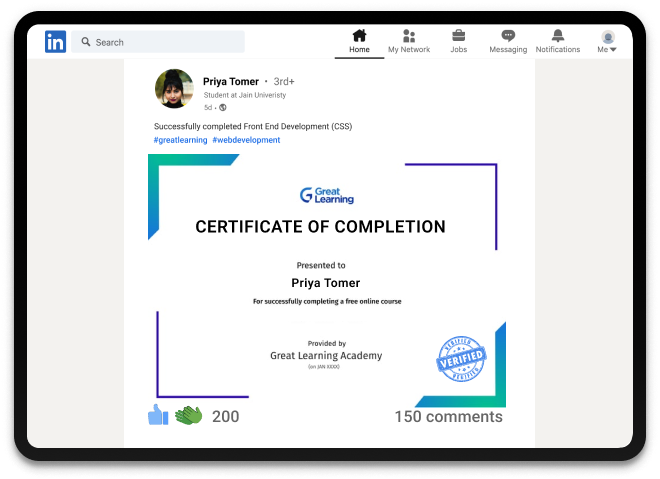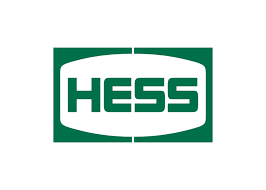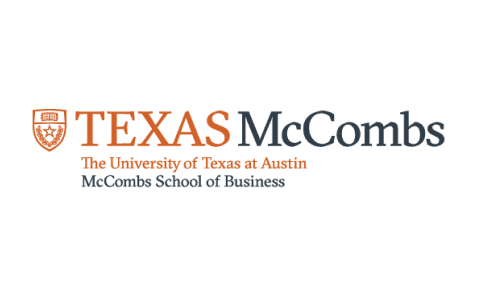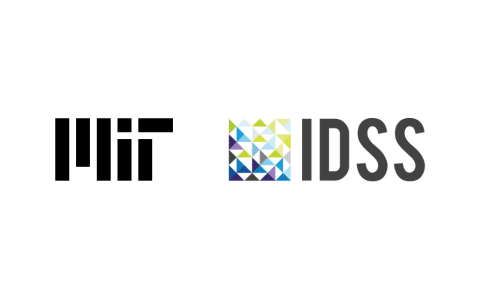Linear Programming for Data Science
Enhance your optimization techniques by learning Linear Programming for Data Science.
What you learn in Linear Programming for Data Science ?
About this Free Certificate Course
Linear programming is an optimization technique to identify the optimal solution in a mathematical or business model for a system of linear constraints and a linear objective function. Linear Regression in Data Science is one of the hot topics today. It is a technique that identifies a linear relationship between dependent and independent variables. And in this course, you will get introduced to Linear Programming, its Graphical method, sensitivity analysis, and assumptions in Linear Programming, and some hands-on exercise.
Some best universities in the world, like MIT, NUS, UT Austin, Northwestern University, and many more universities, have collaborated with Great Learning to design the best online data science courses. Gain advanced data science and machine learning skills through an exhaustive curriculum developed by the world-class faculty. They provide you with a world-class education in the data science and machine learning course. Post completion, secure a Post Graduate, Degree, or Professional Certificate in the field.
Check more information about our programs and apply right away so that you can become a professional data scientist.
Course Outline
Linear programming is a mathematical modeling technique in which a linear function is maximized or minimized when subjected to various constraints. In this module, you will be introduced to linear programming.
Our course instructor

Dr. Abhinanda Sarkar
Faculty Director, Great Learning
Dr. Sarkar’s publications, patents, and technical leadership have been in applying probabilistic models, statistical data analysis, and machine learning to diverse areas such as experimental physics, computer vision, text mining, wireless networks, e-commerce, credit risk, retail finance, engineering reliability, renewable energy, and infectious diseases, His teaching has mostly been on statistical theory, methods, and algorithms; together with application topics such as financial modeling, quality management, and data mining.
Dr. Sarkar is a certified Master Black Belt in Lean Six Sigma and Design for Six Sigma. He has been visiting faculty at Stanford and ISI and continues to teach at the Indian Institute of Management (IIM-Bangalore) and the Indian Institute of Science (IISc). Over the years, he has designed and conducted numerous corporate training sessions for technology and business professionals. He is a recipient of the ISI Alumni Association Medal, IBM Invention Achievement Awards, and the Radhakrishan Mentor Award from GE India
With this course, you get
Free lifetime access
Learn anytime, anywhere
Completion Certificate
Stand out to your professional network
3.0 Hours
of self-paced video lectures
Frequently Asked Questions
Is linear programming used in Data Science?
Linear programming can be used in Data Science to find the optimal solution to a situation with linear constraints and objective function. You can learn more about the role of linear programming in Data Science through Great Learning’s free Linear Programming for Data Science course.
What is linear programming in decision science?
Linear programming is a decision science technique used to solve problems with multiple variables and constraints. It is based on the principle of maximizing or minimizing a linear function subject to a set of linear constraints. This method has effectively guided quantitative conclusions in business planning, industrial engineering, and to a minor extent - the physical and social sciences. You can understand Linear Programming better through Great Learning’s free Linear Programming for Data Science course and gain a free certificate on course completion.
Will I get a certificate after completing this Linear Programming for Data Science free course?
Yes, you will get a certificate of completion for Linear Programming for Data Science after completing all the modules and cracking the assessment. The assessment tests your knowledge of the subject and badges your skills.
How much does this Linear Programming for Data Science course cost?
It is an entirely free course from Great Learning Academy. Anyone interested in learning the basics of Linear Programming for Data Science can get started with this course.
Is there any limit on how many times I can take this free course?
Once you enroll in the Linear Programming for Data Science course, you have lifetime access to it. So, you can log in anytime and learn it for free online.
Success stories
Can Great Learning Academy courses help your career? Our learners tell us how.And thousands more such success stories..
Related Data Science Courses
Popular Upskilling Programs
Explore new and trending free online courses
Relevant Career Paths >
Other Data Science tutorials for you
Linear Programming in Data Science
Linear programming for Data Science is a course designed to help learners understand and apply the principles of linear programming in the Data Science context. It provides an in-depth understanding of linear programming principles, assumptions, and applications and their practical applications in areas such as optimization and decision-making. The course includes a wide range of topics, including introduction to linear programming, graphical method, sensitivity analysis, and assumptions in linear programming.
This course on Linear Programming for Data Science is designed to provide learners with a comprehensive overview of the principles and techniques of linear programming. Learners will learn to apply linear programming to solve various optimization problems. The course will begin by discussing the basics of linear programming, definitions, and the different mathematical models.
The graphical method is used to represent linear programming problems graphically. This method is used to identify the optimal solution and analyze the solution's sensitivity to changes in the problem parameters. The graphical method is used to identify the optimal solution and also analyze the sensitivity of the solution to changes in the problem parameters.
Sensitivity analysis is also included in this course. This is an essential tool used in linear programming to examine the effects of changes in the parameters or the problem's constraints on the optimal solution. This method is used to identify the optimal solution and analyze the sensitivity of the solution to changes in the problem parameters.
Finally, the assumptions in linear programming are discussed. This includes the assumptions of linearity, homogeneity, additivity, convexity, and non-negativity. These assumptions help to simplify the optimization process, leading to faster and more accurate solutions.
This course on linear programming for data science provides learners with a comprehensive understanding of the principles, assumptions, and applications of linear programming. Learners will gain a strong understanding of the mathematical models and the graphical methods used to solve linear programming problems. Furthermore, they will gain an understanding of the assumptions of linear programming and the sensitivity analysis used to identify the optimal solution. This course is an excellent resource for learners interested in applying linear programming in the data science field.




















































